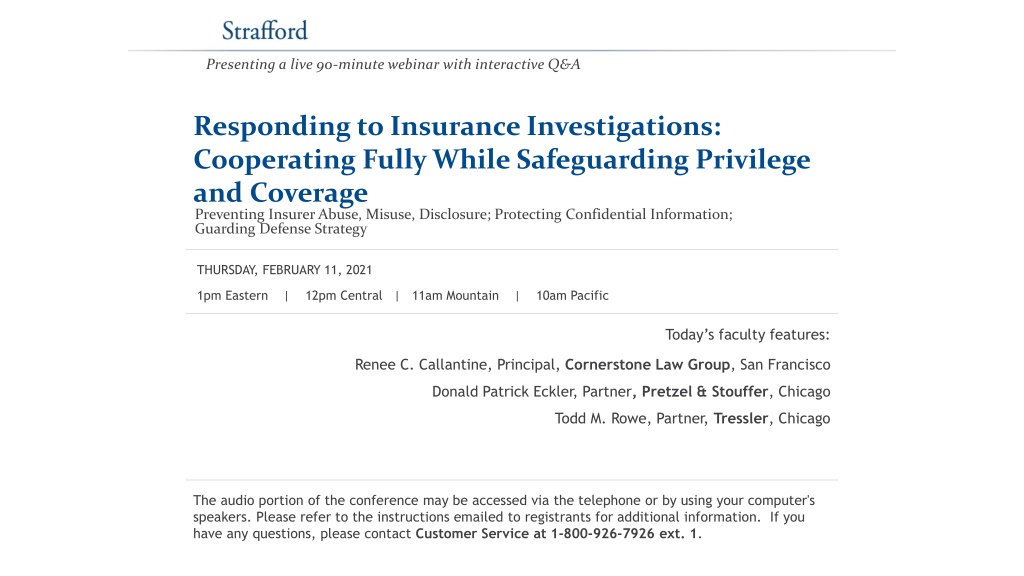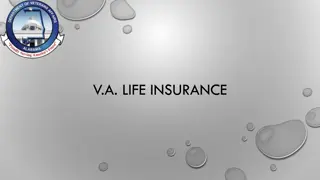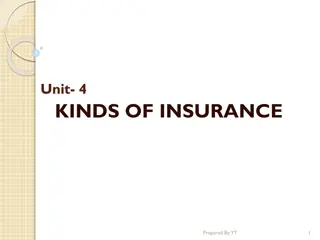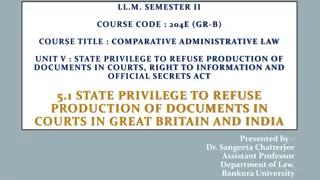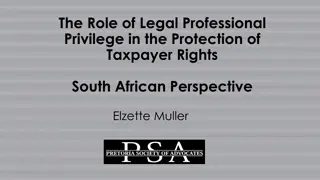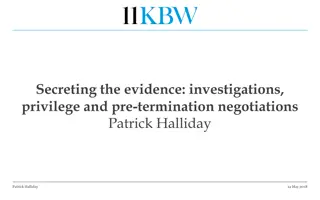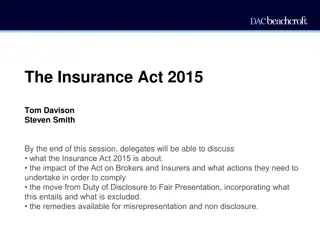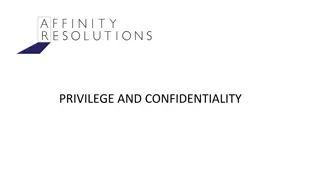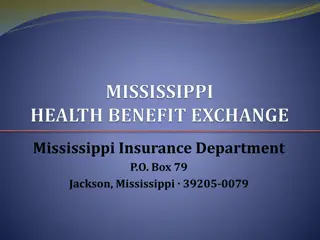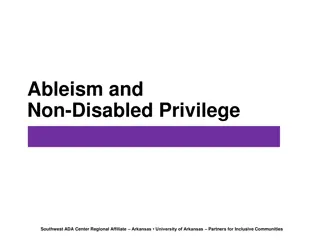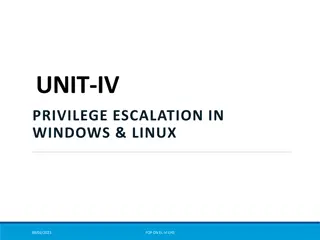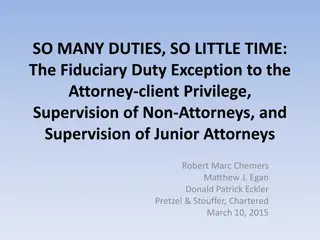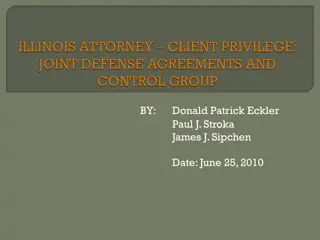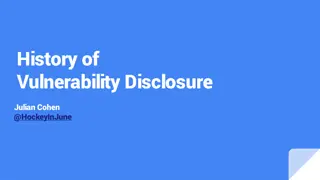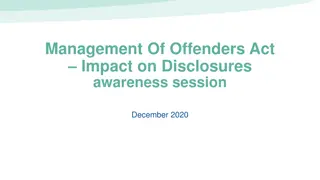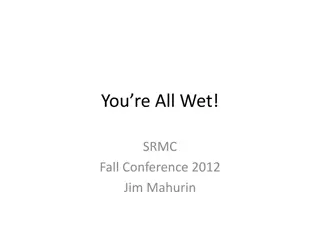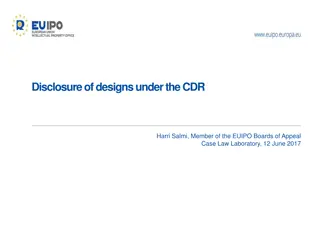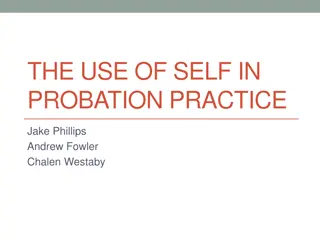Insurance Investigations: Handling Privilege, Coverage, and Disclosure
Explore the nuances of responding to insurance investigations in this 90-minute interactive webinar. Learn how to cooperate effectively while protecting privilege, coverage, and confidential information. Gain valuable insights on preventing insurer abuse, misuse, and disclosure, as well as safeguarding your defense strategy. Join experts Renee C. Callantine, Donald Patrick Eckler, and Todd M. Rowe on Thursday, February 11, 2021, to enhance your understanding of navigating insurance investigations with integrity.
Download Presentation

Please find below an Image/Link to download the presentation.
The content on the website is provided AS IS for your information and personal use only. It may not be sold, licensed, or shared on other websites without obtaining consent from the author. Download presentation by click this link. If you encounter any issues during the download, it is possible that the publisher has removed the file from their server.
E N D
Presentation Transcript
Presenting a live 90-minute webinar with interactive Q&A Responding to Insurance Investigations: Cooperating Fully While Safeguarding Privilege and Coverage Preventing Insurer Abuse, Misuse, Disclosure; Protecting Confidential Information; Guarding Defense Strategy THURSDAY, FEBRUARY 11, 2021 1pm Eastern | 12pm Central | 11am Mountain | 10am Pacific Today s faculty features: Renee C. Callantine, Principal, Cornerstone Law Group, San Francisco Donald Patrick Eckler, Partner, Pretzel & Stouffer, Chicago Todd M. Rowe, Partner, Tressler, Chicago The audio portion of the conference may be accessed via the telephone or by using your computer's speakers.Please refer to the instructions emailed to registrants for additional information. If you have any questions, please contact Customer Service at 1-800-926-7926 ext. 1.
FOR LIVE EVENT ONLY Sound Quality If you are listening via your computer speakers, please note that the quality of your sound will vary depending on the speed and quality of your internet connection. If the sound quality is not satisfactory, you may listen via the phone: dial 1-877-447-0294 and enter your Conference ID and PIN when prompted. Otherwise, please send us a chat or e-mail sound@straffordpub.com immediately so we can address the problem. If you dialed in and have any difficulties during the call, press *0 for assistance. Viewing Quality To maximize your screen, press the Full Screen symbol located on the bottom right of the slides. To exit full screen, press the Esc button.
FOR LIVE EVENT ONLY In order for us to process your continuing education credit, you must confirm your participation in this webinar by completing and submitting the Attendance Affirmation/Evaluation after the webinar. A link to the Attendance Affirmation/Evaluation will be in the thank you email that you will receive immediately following the program. For additional information about continuing education, call us at 1-800-926-7926 ext. 2.
FOR LIVE EVENT ONLY If you have not printed the conference materials for this program, please complete the following steps: Click on the link to the PDF of the slides for today s program, which is located to the right of the slides, just above the Q&A box. The PDF will open a separate tab/window. Print the slides by clicking on the printer icon.
Basics of the Cooperation Clause Basics of the Cooperation Clause The purpose and objective of the cooperation clause in an automobile insurance policy is to prevent collusion between the insured and the injured, as well as to make possible the insurer s investigation. M.F.A Mutual Insurance Company v. Cheek, 66 Ill.2d 492 (1977). A condition in an insurance policy requiring the cooperation of the insured is one of great importance and its purpose should be observed. Waste Management, Inc. v. International Surplus Lines Insurance Company, 144 Ill.2d 178 (1991). 5
Basics of the Cooperation Clause Basics of the Cooperation Clause Typically the insurer has little or no knowledge of the facts surrounding a claimed loss, while the insured has exclusive knowledge of such facts. The insurer is, therefore, dependent on its insured for fair and complete disclosure; hence, the duty to cooperate. While the insured has no obligation to assist the insurer in any effort to defeat recovery of a proper claim, the cooperation clause does obligate the insured to disclose all of the facts within his knowledge and otherwise to aid the insurer in its determination of coverage under the policy. The insurer is entitled, irrespective of whether its duty is to defend or to indemnify, to gain as much knowledge and information as may aid in its investigation, or as may otherwise be significant to the insurer in determining its liability under the policy and in protecting against fraudulent claims. To hold otherwise effectively places the insurer at the mercy of the insured and severely handicaps it in contesting a claim (citation omitted). Waste Management, Inc., 144 Ill.2d at 204. 6
An Insurer Must Show Prejudice An Insurer Must Show Prejudice An insurer is required to demonstrate that it was substantially prejudiced as a result of a breach of a cooperation condition which means the insurer must show it was actually hampered in its defense of the action. M.F.A. Mutual Insurance Co., 66 Ill.2d at 499-500. Without the presence of the assured and his aid in preparing the case for trial, the insurance company is handicapped and such a lack of cooperation must result in making the action incapable of defense. Schneider v. Autoist Mutual Ins. Co., 346 Ill. 137, 140 (1931). In Cheek, the Court found that there was no prejudice to the insurer because the insured corrected the problem before the insurer suffered prejudice in the defense of the case. 7
What Constitutes Prejudice? What Constitutes Prejudice? In Gallaway v. Schied, 73 Ill. App. 2d 116, 123 (1st Dist. 1966) the court explained the impact the prejudicial effect the breach of the cooperation condition had on the insurance company: In the case at bar, because of the failure of the insured to appear for deposition, her pleadings were stricken and the issue of liability was determined adversely. The opportunity to contest the issues of contributory negligence, due care, proximate cause, and of cross-examination, etc., were precluded. The circumstances concerning the degree of impact, res gestae reaction, if any, and incidents that might assist in the true determination of damages were denied to the defense. There can be no doubt that the conduct of the insured in failing to cooperate substantially and materially affected the insurer and its rights. 8
What Constitutes Prejudice? What Constitutes Prejudice? Failure of the insured to provide discovery answers, appear at deposition, appear at arbitration, or appear at trial leading to a barring order or adverse finding. It is necessary to demonstrate what could have been shown had the insured appeared and cooperated. Accordingly, any statement of the insured becomes important, including the conditions of the accident, the weather, a short stop by the plaintiff, such that even a rear end case can be shown to be defensible. 9
What Constitutes Prejudice? What Constitutes Prejudice? In American Country Ins. Co. v. Bruhn, 289 Ill. App. 3d 241 (1st Dist. 1997) wherein the court held that prejudice was patent where the insured completely refused to communicate with the insurer related to an accident arising out of an alleged criminal act and that notwithstanding the right to remain silent the notice and cooperation clauses were breached. It is important to remember that statements to an insurer are covered the insurer-insured extension of the attorney-client privilege. People v. Ryan, 30 Ill.2d 456 (1964). 10
Insured must be willful in refusal to cooperate Insured must be willful in refusal to cooperate The refusal to cooperate must be willful on the part of the insured. United Auto. Ins. Co. v. Buckley 2011 IL App (1st) 103666, 27. This suggests that the insured must know that a request to cooperate has been made and that the insured understand the consequences of failing to cooperate. 11
An Insurer Must Show Diligence in Contacting the An Insurer Must Show Diligence in Contacting the Insured Insured In Lappo v. Thompson, 87 Ill. App. 3d 253 (1st Dist. 1980), the Court felt that more could have and should have been done to secure the insured s cooperation. Although numerous letters were sent regarding various deposition dates and trial dates, no attempt was made to contact her personally. The failure to respond to letters should have put the company on notice that there was a problem. Thus, the Court held, the insurer failed to establish that it exercised reasonable diligence in securing the cooperation of its insured. Lappo, 87 Ill. App. 3d at 255. 12
An Insurer Must Show Diligence in Contacting the An Insurer Must Show Diligence in Contacting the Insured Insured In Buckner v. Causey, 311 Ill. App. 3d 139 (1st Dist. 1999), the insured William Causey ( Causey ) failed to appear for a trial and judgment was entered against him and in favor of the Plaintiff Gwendolyn Buckner. Causey was first notified of the trial date three days before it was to commence when he received a telephone call from the attorney retained to defend him by his insurance company. Gallant/Warrior failed to meet its burden of showing diligence in attempting to secure the insured s appearance at trial or that Causey refused to appear after receiving adequate notice. Buckner, 311 Ill. App. 3d at 143-144. 13
An Insurer Must Show Diligence in Contacting the An Insurer Must Show Diligence in Contacting the Insured Insured In Wallace v. Woolfolk, 312 Ill. App. 3d 1178 (5th Dist. 2000), Maria Wallace brought a lawsuit for personal injuries against Wenona Woolfolk ( Woolfolk ) arising from an automobile accident. Over the course of six months, counsel retained by the insurer to represent Woolfolk mailed six letters to her. During the one and only telephone conversation with her attorney, Woolfolk stated that she had not received any of the correspondence. Because Woolfolk did not answer written discovery or appear for a discovery deposition, the trial court entered and order of default against her as well as other sanctions. 14
An Insurer Must Show Diligence in Contacting the An Insurer Must Show Diligence in Contacting the Insured Insured Because Woolfolk failed to attend the arbitration hearing, her counsel was barred from rejecting the award in favor of Maria Wallace and judgment was entered against Woolfolk. The Appellate Court agreed with the trial court that the insurer did not exercise reasonable diligence in endeavoring to secure Woolfolk s cooperation. The letter advising Woolfolk of the arbitration hearing was sent to her by regular mail only a week before it was to be held in spite of the fact that Woolfolk had told her attorney that she had not received previous letters. The insurer knew months earlier that Woolfolk was either not receiving the letters or was ignoring them yet took no further steps to determine what the difficulty was. Wallace, 312 Ill. App. 3d at 1183-1184. 15
An Insurer Must Use Diligence in Contacting the An Insurer Must Use Diligence in Contacting the Insured Insured In Johnson v. Wade, 47 Ill. App. 3d 610 (1st Dist. 1977) Wade, the insured, was sent a letter by her attorney on August 16, 1974, advising her that her case was scheduled for trial on September 18, 1974. The letter requested that she contact him immediately regarding her availability to appear on that date. Wade did not respond, yet, no attempt was made to contact her until the day before the scheduled trial date. When the attorney could not reach Wade by telephone, an investigator was retained in an effort to make personal contact with her and ensure her presence at the impending trial. 16
An Insurer Must Use Diligence in Contacting the An Insurer Must Use Diligence in Contacting the Insured Insured Wade had lived at the same address for fifteen years and, prior to that time, had attended court dates as requested. Further, she denied any knowledge of the September 18, 1974 trial date. Johnson, 47 Ill. App. 3d at 612, 614. The court noted that diligence was exercised in pursuing Wade s cooperation as of the day before the trial was to begin but that; the actions taken prior to that time were insufficient. Had it been determined earlier that Wade was reluctant to appear, her counsel still would have had time to issue a subpoena to her or to request a continuance. The court held that the insurer failed to establish diligence and could not argue noncooperation on the part of Wade where one letter was sent giving notice of a trial date that was to occur one month later. In addition, once it was discovered that Wade would not attend the trial, no attempt was made to inform her of the consequences of a failure to cooperate. Johnson, 47 Ill. App. 3d at 615. 17
An Insurer Must Show Diligence in Contacting the An Insurer Must Show Diligence in Contacting the Insured Insured In Safeco Insurance Co. v. Treinis, 238 Ill. App. 3d 541 (1st Dist. 1992), the insured a vehicle owned by Otto Treinis ( Treinis ). On September 11, 1986, while driving the insured vehicle, Treinis roommate was involved in an accident with Gerald Sluzewicz. Treinis reported the accident to his agent within a couple of days. Gerald Sluzewicz filed a lawsuit against Treinis on January 13, 1987. Safeco sent letters to Treinis requesting that he contact it immediately regarding the occurrence. He did not respond. Safeco then began more extensive efforts to contact Treinis beginning in July, 1987. Safeco utilized its house investigator, a skip-trace and an outside investigator in order to locate and contact Treinis without success. The court held that the total lack of contact between Treinis and Safeco constituted noncooperation, especially where there was no evidence of any extenuating circumstances. Safeco Insurance Co., 238 Ill. App. 3d at 549. 18
An Insurer Must Show Diligence in Contacting the An Insurer Must Show Diligence in Contacting the Insured Insured In Gallaway v. Schied, Barbara Schied ( Schied ) was involved in an accident on December 12, 1959. Three days later, she reported the accident to her carrier, Apex Mutual Insurance Company ( Apex ) and shortly thereafter completed a written accident report and forwarded it to Apex. A personal injury lawsuit was filed against Schied as a result of the occurrence, and upon being served with it, sent it on to Apex. In March 1960 Apex sent a letter to Schied advising her that counsel had been retained to represent her in the litigation and that she must cooperate with her attorneys. Letters were sent to her by her attorneys in June and July regarding dates for her deposition. In August of 1960, it was learned from a relative that Schied had moved. Subsequently, letters sent to Scheid were returned unclaimed or marked Move, Left No Address. A private investigator hired by Apex was not able to locate Scheid. The court found that Apex exercised reasonablediligence in attempting to locate Schied and secure her cooperation. Gallaway, 73 Ill. App. 2d at 125. 19
An Insurer Must Show Diligence in Contacting the An Insurer Must Show Diligence in Contacting the Insured Insured The most recent favorable decision regarding the cooperation clause is Founders Insurance Company v. Shaikh, 405 Ill. App.3 d 367 (1st Dist. 2010). In that case, insured acknowledged service of the suit and then disappeared and refused contact. In order to locate the insured Founders set forth in detail, with supporting documentation, the meticulous efforts undertaken to contact the insurer, attempted telephone contact, letters, skip-traces, visits to various locations by investigators and searches of various public records. Letters by both regular and certified mail were sent to each and every possible address. Investigators working on behalf of Founders made in person visits to five different locations in efforts to find Shaikh. Family members too denied any knowledge as to his whereabouts. 20
Responding to Insurance Investigations: Cooperating Fully While Preserving Privilege And Coverage Introduction To The Reservation Of Rights An Important Tool For The Insurance Investigation 1. At what points in the claim process should coverage be analyzed? 2. How do we analyze coverage? 3. What do we mean when we say ROR or reservation of rights? 4. Differences between denials and reservations 21
Responding to Insurance Investigations: Cooperating Fully While Preserving Privilege And Coverage Impact of an ROR on Defenses There are many situations where an insurer may issue an ROR, including the following: Some of the allegations in the complaint do not fall within the scope of the policy s coverage; There is an applicable policy exclusion; Some of the damages are not covered by the policy; The damages alleged exceed the policy limits; The coverage has been exhausted under an aggregate limit of liability; or The policyholder breached a condition of the policy. 22
Responding to Insurance Investigations: Cooperating Fully While Preserving Privilege And Coverage Using The ROR As A Tool For Insurers And Insureds A coverage position letter that is defective or flawed could expose the insurer to uncovered claims based on a waiver if all necessary issues are not addressed. Proper Coverage Position Letter Basics o Contains an accurate description of the facts of the loss; o Letter must identify the specific policy or policies; and o Contains the specific policy provisions giving rise to coverage issues Use plain English to provide position Discussion of American Family Mut. Ins. Co. v. Westfield Ins. Co., 962 N.E.2d 993 (2011). 23
Responding to Insurance Investigations: Cooperating Fully While Preserving Privilege And Coverage The ROR Can Make Life Easier For The Insurer And The Insured Alike It Should Be Surgical And Only Discuss Relevant Policy Terms And Conditions Opportunity To Show Good Faith Opportunity To Discuss Insurer s Adverse Position To Insured Offers Reminders Of The Insured s Duty To Cooperate See Hoover v. Maxum Indemnity Co., 291 Ga. 402, 730 S.E.2d 413 (2012). 24
Responding to Insurance Investigations: Cooperating Fully While Preserving Privilege And Coverage The ROR Should Create A Roadmap For The Insurance Investigation Discussion of J.E.M. v. Fidelity & Cas. Co. of New York, 928 S.W.2d 668 (1996) A sufficient ROR should have Information concerning insurer s position Addresses relevant policy language Addresses relevant terms and conditions in the insurance policy that will impact the insurance investigation 25
Responding to Insurance Investigations: Cooperating Fully While Preserving Privilege And Coverage When is an insured entitled to independent counsel? Some states have held that independent counsel must be provided whenever an insurer reserves its rights (e.g. Missouri) Others require independent counsel only if the reservation of rights creates a real conflict of interest between the insurer and insured. If there is a conflict it must: oNotify the insured of the conflict and of the insured s right to independent counsel at the insurer s expense; oAllow the insured to choose counsel; oPay reasonable attorneys fees for independent counsel; oRelinquish control over the defense and settlement of the claim; oPay any reasonable settlement for covered claims. 26
Responding to Insurance Investigations: Cooperating Fully While Preserving Privilege And Coverage What Happens If An ROR Is Inadequate? Waiver of Defenses The intent to waive a certain right can be inferred from the insurer s conduct, if the conduct is inconsistent with an intention to insist upon a strict performance of the condition. Osprey Consulting v. Westport Ins. Corp., WL 3073326 at 6 (D. Md. 2020). 27
Responding to Insurance Investigations: Cooperating Fully While Preserving Privilege And Coverage Additional Legal Issues Presented By RORs During The Insurance Investigation Position Letters to the Insured Present a Number of Questions Partial or Soft Denials Request for Additional Information Discussion of Hammond v. Lyndon Southern Ins. Co., 2020 WL 4820720 (Aug. 19, 2020). 28
Responding to Insurance Investigations: Cooperating Fully While Preserving Privilege And Coverage Additional Critical Issues After An ROR Has Been Issued After Issuing The ROR- The Insurer may continue to review the claim The Insurer has reserved its right to deny coverage. The defense obligation is broader than the indemnity obligation. Is Insurer continuing to seek information requested in ROR? If additional information is sought, the insured has an obligation under the Cooperation Clause to provide information. 29
Responding to Insurance Investigations: Cooperating Fully While Preserving Privilege And Coverage Additional Critical Issues After An ROR Has Been Issued Unilateral Withdrawal oIf the plaintiff dismisses the only potentially covered count, then the insurer no longer has a duty to defend its insured and can withdraw from the defense. See, Phila. Indem. Ins. Co. v. Chi. Title Ins. Co., 771 F.3d 391, 402 (7th Cir. 2014) oDiscover the applicability of a policy defense which precludes coverage during litigation of the suit, which was not known nor could have been reasonably discovered at the outset. See, Apex Mutual Ins. Co. v. Christener, 99 Ill. App. 2d 153, 168, 240 N.E.2d 742, 750 (1st Dist. 1968) Declaratory Judgment 30
Excess insurer issues Primary insurer concerns In both the first-party and third-party contexts, the primary insurer should have sufficient information in its file to justify the actions that it has taken with regard to the duty to defend and the duty to indemnify. The excess insurer likely has the right in the third-party context to take over the defense of the underlying case, appoint counsel of its own choosing, reasonably demand that the primary insurer offer its policy limits, and other similar actions to protect its interests. 31
Excess insurer issues Primary insurer concerns In the first-party context the concern for primary insurers is more with reinsurers than with excess insurers to justify indemnity payments made or denied. In both contexts concerns by the primary insurer about potential bad faith and other extracontractual liability and the implications to both excess insurers and reinsurers should be kept in mind. 32
Excess insurer issues Primary insurer concerns There is also a risk of bad faith claims from the excess insurer and reinsurer if the appropriate investigation is not undertaken or the other carriers are not kept apprised. In view of those concerns the primary insurer may require information from the insured and other sources through a variety of means to develop and then defend its position. 33
Excess insurer issues excess insurer concerns What does the excess carriers investigation look like? Provisions of the excess policy Applicable law The facts and circumstances of the particular occurrence or claim Whether and to what extent underlying limits have been exhausted or impaired The likelihood of substantial damages being recovered If the occurrence or claim does not implicate its excess policy, the excess insurer will have no obligation to investigate. See Pac. Group v. First State Ins. Co., 70 F.3d 524, 527-29 (9th Cir. 1995). 34
Excess insurer issues excess insurer concerns However, in certain circumstances, the excess insurer should conduct its own investigation, especially if the above factors indicate an investigation by the excess insurer is warranted. See Navigators Ins. Co. v. National Union Fire Ins. Co. of Pittsburgh, Pa, 2013 U.S. Dist. LEXIS 15681, *12 (W.D. Wash., Feb. 5, 2013) (holding excess insurer could not rely on investigation of primary insurer where excess insurer knew claim exceeded limits of primary coverage and it disagreed with primary insurer s evaluation). An excess insurer may not have to conduct its own investigation but may rely upon the investigation of the primary insurer. See Atlanta Int l Ins. Co. v. Checker Taxi Co., 214 Ill. App. 3d 440, 443 (Ill. App. Ct. 1991) ( The primary insurer, not the excess carrier, normally investigates the facts of the occurrence and undertakes the defense of the . . . lawsuit ). 35
General Rules Regarding Permissible General Rules Regarding Permissible Investigation by Insurer Investigation by Insurer Policyholder is required to provide sufficient information about the first or third party claim and any claims developments. Policyholder must substantially comply with policy provisions requiring furnishing books and records to insurer. Hoekstra v. Farm Bureau Mut. Ins. Co., 382 N.W.2d 100 (Sup.Ct. Iowa 1986) Insurer is permitted to rely on policyholder (only?) for those things that cannot practically be completed by insurer. SWC West LLC v. Westport Ins. Corp., 856 F. Supp. 2d 514, 526 (E.D.N.Y. 2012) Insurer is allowed to conduct some investigation into the legitimacy of the claim, especially where claim has some fraud indicators. 36
Abusive and Overreaching Demands Abusive and Overreaching Demands Repetitive demands for information already provided Repetitive demands for inspection Excessive demands for information, especially those that have no bearing on coverage or amount of loss Successive requests for more information that are a pattern of stonewalling Tax returns? Privileged information? 37
Other Abusive Insurer Tactics Other Abusive Insurer Tactics Demanding policyholder dismiss cross-claims or otherwise impair PH s rights against third parties Intervening into policyholder s suit against party responsible for property damage, causing increase in attorney s fees Unfounded threats of withdrawing coverage Intimidating policyholder into reducing claim or contributing to third-party settlement 38
Pleadings Sufficient to Survive Motion to Pleadings Sufficient to Survive Motion to Dismiss Dismiss DK Property, Inc. v. National Union Fire Insurance Co. of Pittsburgh, PA, 92 N.Y.S.3d 231 (2019) Def. made unreasonable and increasingly burdensome information demands . . . [as] a tactic . . . To make the claim so expensive to pursue that plaintiff would abandon it altogether. . . . Despite substantial documentation of the cause and extent of the damage to plaintiff s building, not only by plaintiff s engineer, but also an engineer that [insurer] hired, defendant has persisted in demanding further, unnecessary monitoring, data collection, inspections, and re- inspections. Sufficient to survive motion to dismiss breach of contract and bad faith claims. Should specify in pleading the information requests that are unreasonable. Scheffler v. American Republic Ins. Co. 2012 WL 602187 (N.D. Okla. 2/23/12) *3. 39
Evidence Sufficient to Survive Motion to for Evidence Sufficient to Survive Motion to for Summary Judgment Summary Judgment Sell v. Country Life Ins. Co. 2017 WL 5705825 (D. Ariz. 2/27/17) Action for breach of disability insurance policy. [Insurer] was aware that in addition to his physical condition, plaintiff was also struggling with the psychological impact of his chronic pain and with a pain medication dependency. Defendant took advantage of his vulnerabilities by withholding benefits . . . . Plaintiff . . . presented evidence that [insurer] ignored evidence of his continuing medical disability . . . but continued to press Plaintiff for evidence of a psychological disability he was not even making. - Sufficient to withstand motion for summary adjudication of punitive damage claim. 40
Evidence Sufficient to Survive Motion for Evidence Sufficient to Survive Motion for Summary Judgment Summary Judgment Larimore v. Travelers Ins. Co. 2014 WL 2632143 (Ct. Appls. KY 6/13/14) *3-4 Much of the documentation requested by Travelers was either non-existent or unavailable to the policyholders, and Travelers knew or should have known this. Travelers took no action on its own to obtain any documentation, despite the fact that detailed documentation about the fatal motor vehicle accident and the injuries sustained was contained within the policy report, accident reconstruction documents, and photographs, all of which were available to Travelers. Travelers continued to make unreasonable demands for documentation, such as the funeral program for the deceased young son. Reversing summary judgment on bad faith claim entered in favor of insurer. (Other evidence of bad faith discussed in opinion.) 41
Sufficient to Survive Sufficient to Survive Daubert Disqualify Expert Disqualify Expert Daubert Motion to Motion to Haymore v. Shelter Gen. Ins. Co. (N.D. Okla. 2/23/12) *3-4 Expert allowed to present evidence that policyholder explained unorthodox purchase transactions to insurer, produced everything insurer requested that was reasonably within his capability to produce; signed broad release giving insurer access to broad range of documents and information; agreed to submitted and submitted cooperatively to examination under oath. This information supported expert s opinions that insurer pretextually made unreasonable demands on policyholder to produce a laundry list of documents and information that it new did not exist and that either were not relevant or should have been obtained directly by insurer. 42
Sufficient to Survive Motion to Dismiss Illinois Sufficient to Survive Motion to Dismiss Illinois Consumer Fraud and Deceptive Practices Act Consumer Fraud and Deceptive Practices Act General Ins. Co. of America v. Clark Mali Corp. 2010 WL 1286076 (N.D. Ill. 3/30/10) *1 Insurer made endless series of requests for documents, obtained sworn statements form policyholder s employees, subjected one of witnesses to 15 hours of sworn testimony over three days, and interviewed policyholder s accountants and public adjuster. Policyholder alleged that some of the information demanded had nothing to do with the incident, including information regarding lawsuits the defendants or any of their other businesses were involved in. Policyholder and related defendants submitted well over 1,500 documents, yet insurer refused to make a decision on the claim. 43
Actions Sanctionable but would not Support Actions Sanctionable but would not Support Claim for Intentional Infliction of Emotional Distress Claim for Intentional Infliction of Emotional Distress Garland v. TravCo Ins. Co. 2002 WL 485702 (W.D. Va. 3/18/02) *1-2 After advising the policyholders that he planned to inspect and photograph damaged home and take their statements, adjuster failed to follow up. Thirty-five days later, insurer had SIU conduct lengthy interview of policyholders and obtain signed authorization to obtain information. The following month, the insurer indicated the investigation was complete and offered to settle the claim for less the $50k. Policyholders were then forced to retain their own expert who valued the damages at five times that amount. Six months later the insurer requested the policyholders submit to examinations under oath and produce documents but only ended up taking one of the two EUOs. Insurer then made a second payment that was half the amount of the policyholders estimate of repairs. Sixteen months after the loss the insurer took a second EUO of one of the policyholders and then requested all bank records. 44
Advice for Policyholders Advice for Policyholders Do not ignore demands of insurer - Respond to reasonable portions of demands - Offer reasonable alternatives where compliance is difficult, impossible, or otherwise undesirable - Seek explanation for demand what is insurer looking for? Do not refuse to communicate with insurer 45
Advice for Policyholders Advice for Policyholders On broadest level, policyholder can do anything in response to perceived abusive/overreaching demands that does not prejudice the insurer. See Cribari v. Allstate Fire & Cas. Ins. Co. 2019 WL 1296581 (D. Colo. 3/21/19) (Explaining that the insurer is prejudiced where it is materially and substantially disadvantaged) Insurer generally has more leeway with its investigation of first party claims because third party claims implicate the interests of claimants. Can policyholder assert 5th Amendment privilege against self-incrimination? File a lawsuit for breach of contract, bad faith, unfair business practices, declaratory relief, statutory claims File complaint with insurance regulatory authority. 46
Third Third- -party Claim Concerns party Claim Concerns Must know whether insurer is providing a defense and, if so, whether it is under a reservation of rights Preserving attorney-client privilege and work-product doctrine while complying with insurer s requests for information Limiting dissemination of confidential information provided to insurer Obligation to provide information that may take claim outside coverage Defense counsel s ethical obligations (See Lake Havasu Community Hospital v. Arizona Title Ins. and Trust Co., 141 Ariz. 363 (1984) 47
Use of Confidentiality Agreements Use of Confidentiality Agreements Contracts between Insurer and Policyholder whereby insurer agrees not to disclose confidential and/or privileged information provided by policyholder Should include description of information covered, how proposed confidential information should be handled Should provide steps to take in the event confidential information is improperly disclosed Not necessarily an absolute protection against waiver of privilege Before entering, policyholder should assess the likelihood of coverage and coverage disputes 48
Contact Information Renee C. Callantine Cornerstone Law Group rcallantine@cornerlaw.com Donald Patrick Eckler Pretzel & Stouffer deckler@pretzel-stouffer.com Todd M. Rowe Tressler trowe@tresslerllp.com 49
To ask a question from your touchtone phone, press *1. To exit the queue, press *1 again. You may also use the Chat function to ask questions, or email questions to insurancelaw@straffordpub.com CLE CODE: TXHILC
